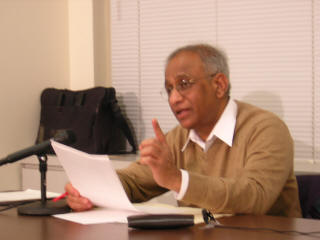CUNY Response to Tsunami Disaster in South Asia Speakers Bureau
Issues Concerning International Relief Efforts in Sri Lanka

This paper is about primary issues one must be familiar with to effectively advance the relief effort in Sri Lanka, my native land. I have divided the content into two sections : 1. Psycho-social counseling and 2. Socio-economic development.
They are not much different from those one faces in disaster situations and developments elsewhere. I will attempt to wrap those issues around Sri Lanka’s history, religious and ethnic diversity, and its socio-economic experiences.
It was two months ago that the tsunami struck in our world already punctured by heart wrenching humanitarian crises in the Sudan, Rwanda, the Congo, Uganda, and Iraq, to name a few places. These crises are no less enormous than those in South and South East Asia, and must certainly not be placed on the back burner as we try to address the tsunami catastrophe.
In the March issue of Scientific American, under the heading “The Scarred Earth”, Madhusree Mukherjee wrote: “The magnitude 9.0 earthquake was the largest ever recorded in the region and the world’s biggest since a 1964 Alaska quake. The tsunami traveled at 700 kilometers per hour sweeping away some 225,000 lives, and millions of livelihoods across twelve nations.” The recalculated toll is now close to 300,000.
